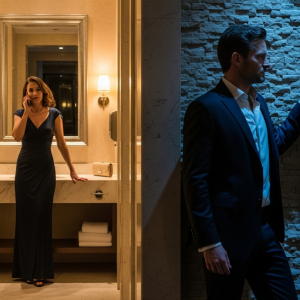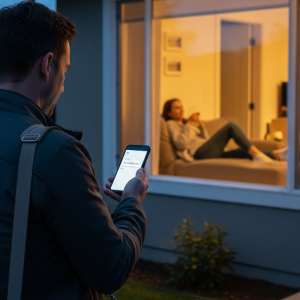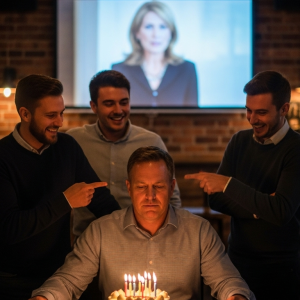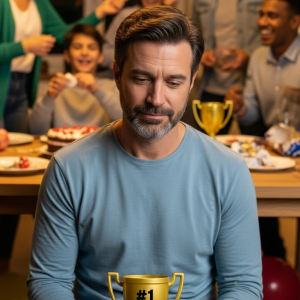My name is Isaac, and I’m thirty now. Some memories don’t fade; they ferment, growing sharper with time. I don’t talk about my childhood much, not because I’ve forgotten, but because saying the words out loud makes it feel real again. Like I’m twelve years old, standing in the middle of that gas station parking lot, clutching a candy bar I couldn’t pay for, watching my parents’ taillights vanish into the night.
It was August, right before school started. We were on one of those awkward “family bonding” trips my mother insisted we needed. In our house, bonding meant my father’s rants were treated as wisdom, and my older brother Caleb’s every mediocre thought was a gift to mankind. I was the quiet one, the sensitive one, the one always in the way.
That day, I’d spilled a soda in the back seat. Caleb, sixteen then and already a master of deflection, smirked and told my dad I’d done it on purpose. My father pulled over at the next highway exit, eyes blazing in the rearview mirror.
“You’re not a baby anymore, Isaac,” he barked, turning around in his seat. “You want to act grown? You can figure your own way home.”
I laughed at first, thinking it was one of his twisted jokes. But then the SUV door slammed shut, and they just drove away. I ran after them, my voice cracking as I called their names, but they were already gone. The gas station clerk poked his head out, a cigarette dangling from his lips, and gave me a look like I was just another stray someone had dumped.
That night, eighty miles from home with no money and no phone, I slept behind the station’s dumpster. I didn’t cry. I think the part of me that believed family was an unshakable thing simply froze that night. The next morning, I found a payphone and called a teacher I trusted, Mrs. Valencia. She was the one who drove an hour and a half to pick me up. I told her my parents must have forgotten me. She didn’t believe it—I could tell by the way her hands tightened on the steering wheel—but she didn’t press.
When I walked through the front door of our house, no one looked surprised. No apology, no relief. My mother glanced up from her laptop. “Took you long enough,” she said. Caleb, on the couch, muttered, “Should have walked faster.” My dad never acknowledged it happened at all.
That was the day I stopped trying to belong. I finished high school like a ghost in the hallways. The moment I turned eighteen, I got out, worked three jobs, and put myself through college across the country without telling them. I changed my number and for the first time in my life, I started to breathe. I’ve spent the last decade building a life they know nothing about. I became a software engineer. I have friends who know me as grounded and loyal. I even adopted a rescue dog, Max, a skittish mutt who flinches at raised voices. We understand each other.
I never thought I’d hear from them again. But last week, a letter showed up. No return address, but the loopy, dramatic handwriting was unmistakably my mother’s. Inside was a wedding invitation for Caleb, engraved in showy gold lettering. Tucked within was a handwritten note on folded notebook paper.
Isaac, we know things have been distant, but Caleb is getting married and it would mean a lot to the family if you could attend. He asked us to reach out personally. We hope you’ll come. We’d love to reconnect.
Reconnecting, as if we were ever connected in the first place. As if they hadn’t left me to rot behind a dumpster. I almost tossed it in the trash. But then something in me paused. The fiancée’s name was Emily R. Kensington. The Kensingtons were local royalty in our hometown—old money, old gossip. Of course Caleb landed her. He was the charming son with the quarterback smile whose parents orbited him like he was the sun.
That night, I found their wedding website. It was a monument to curated perfection, complete with a section titled “Our Love Story,” written from Caleb’s perspective. It was polished, romantic, and utterly fake. Then I read one line that made my blood run cold. He was talking about Emily: “…the way she looked at me and saw more than just the guy I used to be.”
The guy he used to be. A bully in khakis. A liar with a halo. The same boy who pushed me into a pond at my own birthday party and told our parents I slipped. Here he was, rewriting history, pretending there was no collateral damage on his path to manhood.
I wasn’t planning to go. Not until I read that line.
I didn’t RSVP online. That would be too easy. Instead, I began to plan, quietly and carefully. I had a custom suit made—midnight blue, elegant, the kind of suit that makes people notice. I booked a room at the luxury guest hotel listed on their site, paying upfront under a slightly different name. I didn’t want them to know I was coming.
Two weeks before the wedding, I sent a single, anonymous email to the RSVP address. It just said: “Looking forward to the celebration. Please don’t mention I’m attending. I’d like to surprise the happy couple. – Isaac”
The week of the wedding, I packed light: the suit, polished shoes, and one other thing. A faded, folded photo of a twelve-year-old boy standing outside a gas station, his eyes wide with a fear he didn’t yet understand. Mrs. Valencia had taken it that morning she picked me up. She mailed it to me years later with a note: “You survived.” I wasn’t sure what I was going to do with it, but it felt right to bring it.
The vineyard was a movie set. Rolling hills, fairy lights, perfect weather. The rehearsal dinner was in full swing when I arrived. I watched from a distance as my parents schmoozed with Emily’s family. My mother, thinner and more brittle than I remembered, laughed a laugh that never reached her eyes. My father, puffier and red-faced, wore a blazer that couldn’t hide his discomfort.
Then Caleb turned, and for the first time in a decade, we locked eyes. I saw it—a flicker of panic before he composed his face, raised a glass in a mock toast, and quickly turned away. But he knew. And more importantly, I now knew he hadn’t told our parents I was coming.
The next day, at the ceremony, I kept to the back. An elegant, silver-haired woman approached me. “You must be Isaac. I’m Evelyn Kensington, Emily’s mother.”
My guard went up. “Caleb told us you might be here,” she said, her smile tight. “He said there had been some distance, but he hoped this would be a step toward healing.”
So, he had told her side of the family, but not his own. Interesting.
The ceremony was predictable—vows, rings, the kiss. The reception was held in a massive glass hall with chandeliers like frozen waterfalls. Guests were directed to their seats by calligraphy cards. Mine didn’t exist.
I wandered to the table where my parents sat. There was an empty chair beside them.
“Oh, you made it,” my mother said, sipping her wine, not even standing. My father just stared, his expression unreadable. “I didn’t see a seat card for me,” I said calmly. “Must have been a mistake,” my mother shrugged. “We didn’t handle the seating.”
Just then, Caleb walked directly toward me, his smile a mask. “Hey,” he said, his voice low. “Glad you could make it.” “You invited me,” I replied. “I asked Mom and Dad to send the invitation,” he corrected. “That’s different. I figured you’d see it, toss it, and move on, like you always do.” I looked at him—tanned, styled, a man who had never paid for anything in blood or silence. “I came because I wanted to see if you remembered.” “Remember what?” I didn’t answer. I reached into my jacket and pulled out the photo. I held it up. His expression shifted. His eyes darted from the photo to my face and back. He swallowed. “That was years ago, Isaac. It was one bad night. You were dramatic even then. I thought you were over it.” Over it. Something inside me went perfectly still. “I’m not here to ruin your wedding,” I said quietly. “But I am staying until the speeches.” He looked at me, unsure if I was bluffing. I wasn’t. Because the best revenge isn’t loud. It’s surgical. And I had a toast prepared, one they’d never forget.
The ballroom lights dimmed. After Emily’s father and the best man gave their rehearsed, heartfelt speeches, the MC took the mic. “And finally, we have a special toast from Isaac.”
The room went quiet. My parents froze. Caleb’s jaw tightened. I stood and walked slowly to the mic, the weight of a hundred confused stares on me.
I tapped the mic once. “Good evening,” I said, my voice steady. “I’m Isaac, Caleb’s younger brother.” A ripple of murmurs went through the room. “I wasn’t sure I was going to come tonight. You see, I haven’t spoken to my family in over a decade.”
The silence in the room became absolute, so thick you could feel it.
“I got a wedding invitation out of nowhere,” I continued, “with a note that said, ‘It would mean a lot to the family if you came.'” I paused, then pulled the photo from my pocket and held it up.
“This is me at twelve years old,” I said, letting them see. “This was taken the morning after my parents left me at a gas station eighty miles from home. I had spilled a soda in the car. Instead of scolding me, they told me to ‘man up’ and drove away.”
A few guests gasped. I saw Emily’s mother bring a hand to her mouth.
“They didn’t come back. They didn’t call. I slept behind a dumpster. The only reason I made it home was because a teacher picked me up the next day. I never got an apology. Not from my parents. Not from Caleb, who was in the car and watched it happen. And until this wedding invitation arrived, I was under the impression they were all perfectly happy pretending I didn’t exist.”
I looked directly at my parents. My dad’s face was ashen. My mother’s mouth hung open.
“Now, I’m not here to ruin anyone’s evening,” I said, my voice calm. “Emily, you seem lovely. But weddings are about truth. And it wouldn’t be honest for me to stand here and pretend we were ever a family that valued protection over survival. I was invited here to play a part in a picture-perfect day—a brother-shaped placeholder.”
I looked back at Caleb. “So, consider this my gift to you.” I placed the photo on the head table, right in front of his plate. “A reminder of what family looks like when you turn your back on it.”
Then I turned and walked away from the mic. No applause, just stunned silence. As I walked past my parents’ table, my father started to rise, but I didn’t stop. I didn’t look back. I exited the hall and walked out into the cool night air. I wasn’t angry. I wasn’t shaking. I was free.
Back at the hotel, I had a voicemail. It was Emily. Her voice was low, brittle. “I wish someone had told me,” she said. “I just… I wanted you to know I’m not mad. You deserved to say what you did. And I’m sorry.” She hung up. It was the first apology I’d received in eighteen years, and it wasn’t even from my family.
I left early the next morning. When I got home, to my small apartment where Max greeted me with excited barks, something strange began to happen. People started reaching out. A cousin, apologizing for never asking where I went. Mrs. Valencia, telling me how proud she was. I hadn’t cried in years, but I did that night—a quiet, aching release.
A week later, I got an email from a woman who worked at a nonprofit for estranged adults. She’d heard about the speech from someone who worked the event. She asked if I’d be willing to speak at one of their private retreats.
I said yes. That one event turned into four. Then an invitation to sit on a panel about family trauma. I always brought the photo. And every time I told my story, someone would come up afterward and say, “That happened to me, too.” My voice, the one they used to call too soft, had finally found its volume. It wasn’t revenge. It was power.
The real fallout started with another email from Emily.
Isaac, I need you to be honest. Did it really happen like that? I asked Caleb. He just said, “It’s complicated.” But you didn’t sound complicated. You sounded clear. They erased you. And now I’m wondering what else they’ve rewritten. Would you be willing to meet?
We met at a quiet café. I told her everything—not the thousand small cuts, but the big ones. The forgotten birthdays, the refused student loan while Caleb got thousands for a vacation. She listened, her hands wrapped around her mug. Finally, she whispered, “What if they do that to our kids someday?”
Three days later, I got a letter. It was from my father.
Isaac, I don’t know what you think you’re doing. This isn’t helping anyone. You’re bringing shame on the family. Let it go. If you keep stirring things up, there will be consequences.
No apology. Just a threat. I scanned the letter, saved it, and called a journalist I’d met on one of the panels. “I’m ready to tell my story,” I said. “And I want to show them.”
The article was published under the title: Left Behind: One Man’s Quiet Escape from a Family That Tried to Erase Him. It went viral. The journalist had verified every detail, interviewing Mrs. Valencia and others. The story included the photo, quotes from my speech, and a scanned, blurred image of my father’s threatening letter.
The day it dropped, I got an email from Emily’s brother. My parents are furious. Not at you, at Caleb. They feel they were lied to. They’re meeting with Emily today.
Two days later, Emily confirmed it. Caleb had exploded, accusing me of ambushing him. She had chosen. The marriage was being annulled.
Three days after that, my parents called. I let it go to voicemail. It was my mother, her voice trembling with fury. “How dare you? You’ve ruined Caleb’s life! You think this is justice? It’s cruelty!” Then my dad got on. His voice was quiet, defeated. “Congratulations. You’ve destroyed your family. Don’t ever call us again.”
But he was wrong. I didn’t destroy my family. They destroyed the version of me that still needed them. I took the photo of the twelve-year-old boy out one last time, and I smiled at him. Then I put it away. Not because I was burying the past, but because I had finally finished writing the ending. The best revenge isn’t watching them crumble. It’s watching yourself rise in full daylight while they’re still trying to rewrite the dark.




